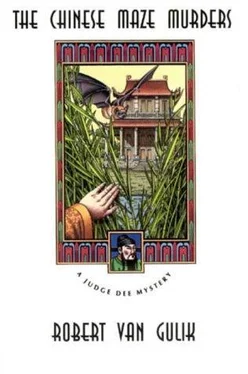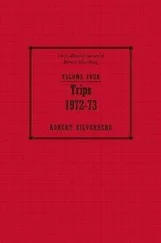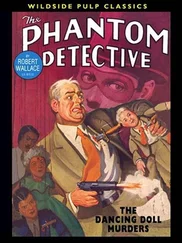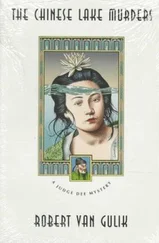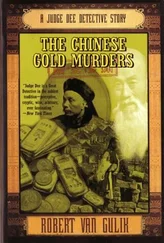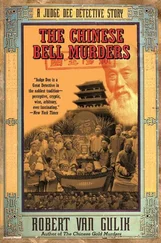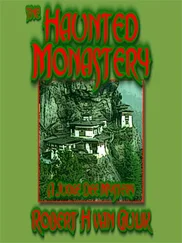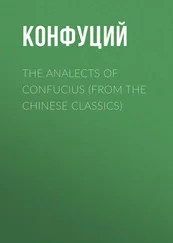JUDGE DEE EXPLAINS THE MURDER OF GENERAL DING; HE REVEALS THE SECRET OF THE SCROLL PICTURE
In the meantime Headman Fang, had had a long talk with Woo.
Evidently Woo was interested in nothing but White Orchid's disappearance. He had completely forgotten his days in jail and the whipping he had received in the tribunal. For a few moments he listened absent-mindedly to the headman's explanation of how General Ding had met his end. Then he interrupted peevishly:
"I have not the slightest interest in that accursed Ding clique. What I want to know is how we shall go about locating your eldest daughter! You realize, by the way, that I intend to approach a middle-man about our marriage as soon as she is found!"
The headman bowed in silence. Secretly he was very proud that such a distinguished young man wanted to marry his daughter. But he was shocked by his casual reference to these matrimonial plans. As most middle-class householders, Fang was a stickler for formality, and it is a fundamental rule of propriety that the prospective groom shall not touch upon this subject directly with the father of the bride until a middle-man has approached him. It was his strict sense of propriety that had made the headman tell his daughter Dark Orchid to gather information about Mrs. Lee, as Sergeant Hoong had ordered. Fang did not like to execute that order himself for he reasoned that it might reflect on Mrs. Lee's good name if a man made inquiries about her.
Headman Fang hastily changed the subject, saying:
"I expect that His Excellency will tomorrow evolve a new plan for the search. In the meantime you, Mr. Woo, could perhaps paint four or five real portraits of my missing daughter, to be circulated among the wardens of the other quarters of this town."
"That is an excellent idea!", Woo exclaimed enthusiastically, "I shall go back home and set to work immediately!"
He jumped up but the headman laid a restraining hand on his arm. He said diffidently:
"Would it not be better, Mr. Woo, if before leaving the tribunal you requested to see His Excellency? You have not yet taken leave of him properly, and perhaps you might thank him for clearing you of suspicion."
"Later, later!", Woo said airily and rushed away.
Judge Dee had partaken of a frugal luncheon in his private office with Sergeant Hoong attending upon him.
The sergeant saw that the judge looked tired. He ate in silence.
When the meal was over Judge Dee lingered over his tea. At last he said:
"Sergeant, call my other lieutenants. I want to tell all of you the full story of the General's murder."
When his four lieutenants were gathered in front of him, Judge Dee settled back in his armchair and told them the substance of his private conversation with Candidate Ding.
Tao Gan shook his head in perplexity. Heaving a deep sigh he said:
"Your Honour, it seems to me that never before have we been confronted with such a mass of complicated problems!"
"Superficially it looks that way", the judge replied. "In fact it was only the local background that complicated everything. Now the confused threads are gradually becoming untangled and a clear pattern emerges.
We have but three real cases. First, General Ding's murder. Second, the case Yoo versus Yoo. Third, the disappearance of Fang's daughter.
Our measures against Chien Mow, our discovery of Yoo Kee's scheme, and the solution of Magistrate Pan's murder, must be viewed as local background. They are separate issues and have nothing to do with the substance of our three cases."
Sergeant Hoong nodded. After a while he remarked:
"I have been wondering all along why Your Honour did not proceed immediately against Woo. At first all evidence pointed strongly to his guilt."
"At our very first meeting", the judge answered, "Candidate Ding behaved in a suspicious way. When I and Ma Joong met him in the street, he could not conceal his consternation when I disclosed my identity. Since I have the undeserved reputation of a detector of crimes, Ding evidently thought for a moment of abandoning his plan of poisoning his father and throwing the blame on Woo. Then he decided that his scheme was flawless and that after all he could take his chance. He invited us to a tea house and dished out his story of Woo's designs on General Ding's life."
"That bastard Ding fooled even me!", Ma Joong exclaimed angrily.
Judge Dee smiled and went On:
"Then the General was killed. Young Ding had not the slightest idea of what could have happened. I checked that again this morning. You saw that I suddenly produced the fatal writing brush, pointing the open end of the shaft right at Ding's face. If it had been Ding who had tampered with that brush after the Governor had presented it to the General, Ding would certainly have betrayed himself.
As it was, Candidate Ding must have been as puzzled by this mysterious murder as we. He must have had an anxious half hour, trying to find out what had happened. Had his paramour had a hand in the killing? Was it someone who had found out about his murder plot and who would in due course ask for a substantial reward for having executed his scheme for him? Then Ding decided that his original plan of making Woo the culprit must be carried out anyway. With Woo's guilt established, Ding need not be afraid of the real murderer intimidating or blackmailing him. Thus he came rushing in here and accused Woo. Ding, however, did not realize that the false trail he had so carefully constructed was extremely poor."
"That is beyond me, Your Honour!", Tao Gan interrupted. "That box of poisoned plums pointed straight to Woo!"
"Too much so", the judge replied. "It was badly overdone and moreover based on a wholly mistaken evaluation of Woo's character. Woo is an over-clever and excitable young man of a type that, I must confess, is not very sympathetic to me. But he undoubtedly is a great artist. Such persons are usually rather vague and casual about the routine of daily life, but they show a tremendous capacity for concentration as soon as it regards things they are really interested in. If Woo chose to poison some one he would certainly never use gamboge, and never overlook such a blatant clue as his seal on the paper inside the box."
Tao Gan nodded.
"The final proof of Woo's innocence", he said, "was his willingness to eat the new plums I had put inside that box."
"Exactly!", Judge Dee said. "However, let us keep to the chronological order of developments. When Ding had reported the murder, I immediately went to see Woo. I wanted to compare the personalities of accuser and defendant. I forthwith decided that Woo was hardly the type to commit a premeditated murder, let alone because of such a far-fetched motive as suggested by Ding.
I assumed that the actual killing had been done by a third person. I could well imagine that a man who had committed such a black crime as General Ding would have many enemies, and I took it that Ding utilized this fact for discrediting Woo. As to Ding's reason for persecuting Woo I assumed that they were rivals in love. The recurring portrait of a girl in Woo's paintings and Ding's love letters convinced me that both young men were in love with the same girl.
Our discovery of the box with poisoned plums strengthened me in my conviction that Ding was scheming against Woo. I assumed as a matter of course that Ding had taken due precautions that the poison would be discovered before his father ate the plums. I reasoned that a man would never risk his father's life in order to get rid of a rival in love."
"Yes", Sergeant Hoong interrupted, "I now understand why Your Honour ruled out Woo as the culprit."
"Indeed", Judge Dee replied, "I considered Ding as a treacherous and mean character. This prepared me for the next development, namely when I discovered that Woo and Ding were not in love with the same girl. This fact reduced the connection between Woo and Ding to the latter's false accusation. But why then had Ding accused Woo at all? The only possible answer was that Ding himself had killed his father and planned to use Woo as scapegoat.
Читать дальше
